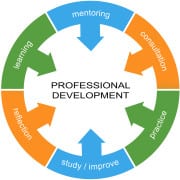Designing your personalized professional development plan
A lot of law firms are working to make their associate review processes more useful — and some are even succeeding. Over the last 2-3 years, it’s become quite vogue to require associates to design a professional development plan so that they and the firm can track their progress. Although the plan is designed to be co-created by the lawyer and the firm, it’s obvious that the firm has a strong interest in the program and that the lawyer is likely to accede to the firm’s “suggestions.”
And please understand: I’m not knocking the firms that insist on such a co-creation. It’s appropriate for the firm to bear a strong interest in ensuring that its employees develop the skills that the firm believes necessary for the employee’s development and his contribution to the firm’s development. And devising such a plan is certainly a huge advancement over the stereotypical reviews in which a lawyer is told everything is “going just fine” right until things fall apart because no one is comfortable with confrontation or honest feedback. (This is a real, if counter-intuitive, problem in many firms!)
But while the firm-sponsored professional development plan is a great start, it’s insufficient for most lawyers. Given the associate attrition rates and the ease with which lawyers can change firms, it’s a mistake to assume that you will remain with a firm for your entire career no matter how happy you may be there today. And even if you do stay at the same firm for the entire length of your career, it’s a sure bet that you won’t do so as an employee. Instead, you’ll develop your own practice (albeit within the firm’s structure) and in so doing, you’ll be running your own “business” in a very real sense.
So, what’s the answer? Designing your personalized professional development plan. Starting with the plan co-created with the firm makes for a nice running start, but if you don’t have such a plan (or if you’re unhappy with your plan), consider the following questions:
* What are your professional strengths? How can you maximize them?
* What are your professional weaknesses? How can you best compensate for them?
* What can you do to develop your strengths even more?
* What do you want your practice to be composed of? Consider substantive law and the mix of practice areas, type of work, what you want your days to look like, etc.
* What kind of practice will be fulfilling at the apex of your career? Describe the setting, the financial aspects, etc. as clearly as possible.
* What is your practice goal in 1 year? 5 years? 10 years? Again, describe it in as much detail as possible.
* What skills and experiences do you need to develop to reach your 1-, 5-, 10-year, and apex practice goals? If you have trouble with this step, consider gathering data by asking your mentors and successful colleagues, researching in practice development books, etc. Remember that your answer will change over time. Nothing about your plan will be written in stone, but the more clarity you can gain now, the better your gameplan and the higher likelihood that future changes will be adjustments rather than complete reworkings.
* What habits, attitudes, or mindsets do you need to develop to attain these goals? For example, do you need to break free from the sense that the firm owns you and to recognize that you are designing your practice and your professional life in conjunction with the firm? Do you need to develop your confidence to increase your client development opportunities and/or your presentation skills? Do you need to break your procrastination habit or to put your perfectionistic tendency in its proper place?
* What will you choose to focus on from these lists over the next year? I recommend a mix of skills/experiences and attitude/habit development goals. For instance, you might set goals of becoming the go-to person on a certain area of the law within your firm and in the outside world, handling a client matter by yourself (with appropriate supervision but little direction if any), learning how to delegate work effectively to more junior lawyers and to staff members, and how to design and implement a business development plan that works. (Note that this final goal has a number of subparts that are focused on developing skills and habits/attitudes, and it’s likely a multi-year goal with progress and its measurement changing each year!)
The key difference between your personalized plan and the plan that you may co-create with your firm is that the personalized plan is keyed to your goals without attention to the firm’s goals except to the extent they support your desires. Your plan should be designed to fit what you — as owner of your practice and “CEO” of your career — want. The two plans might be identical, or they may be quite at odds. If you know that in 10 years you’d like to have a personal injury practice with a partner ready and willing to buy you out so you can compete in the America’s Cup, for instance, that’s almost certainly a goal that you’d be wise not to share if you’re working in a mid-sized insurance defense firm because your goals and the firm’s goals don’t mesh.
Finally, I suggest spending time in the fall roughing out your personalized professional development plan. It’ll give you a good idea of where you’re headed when you have your annual review, and you’ll be ready to suggest the developmental areas that you’d like to work on in the next year. In addition, you’ll be ready to incorporate the feedback you get into your plan. So, start now. Set aside time on your calendar, and mark it in ink. Designing your plan will move you forward like little else. Don’t miss this opportunity.




Leave a Reply
Want to join the discussion?Feel free to contribute!